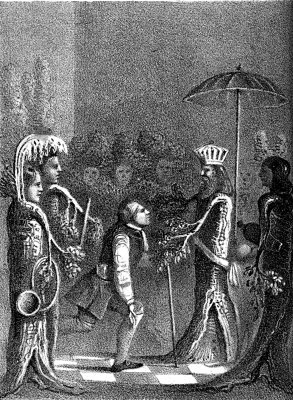The king received me very graciously, uniting in a remarkable degree, while addressing me, mildness of tone with dignity of expression.

At my entrance into the hall, I knelt before the throne: the king demanded the meaning of the ceremony. Having told him the reason, he remarked, that such worship was due only to the Divinity. When I had raised myself, he put to me several questions—demanding how I had come down?—the reason of my journey—my name—where I came from, &c., all which questions I answered truly. Finally, he inquired concerning my religion, and was evidently much pleased with our creed. I was ordered to wait till dinner was over. At the table were seated with the King, the Queen, Prince, and Kadok, or great chancellor. At a certain sign, a maiden tree entered, bearing in her eight branches, as many dishes, which was the number daily served at the royal table. Another tree entered with eight bottles, filled with as many different juices. In the dinner conversation, frequent mention was made of myself.
After dinner, the King ordered me to show my testimony. After reading it, he looked at my legs. "The Karatti are perfectly right!" said he; "and their advice shall be followed." A Kiva, or secretary, was now sent for, to enter me, among others, in the royal register of promotion. This Kiva was a tree of remarkable external appearance; he had eleven branches—a singular number—and was able to write eleven letters at once. With this tree I afterwards became very intimate; he wrote all the letters which I, as footman, carried about the country.
On receiving my appointment, I went to bed. Although I was much fatigued, I could not get any sleep for a long while. However, I fell, at last, into an uneasy slumber, from which I was suddenly roused by an uncommonly large monkey, which, on opening my eyes, I found playing all manner of tricks with me, much to the amusement of several young trees, my companions. The king laughed heartily over the jokes of the monkeys, when they were related to him, but at the same time, ordered me to be clothed in the subterranean manner; that is, ornamented with branches, as I had been at my first arrival below ground. My European clothes were taken from me and hung up in the museum, with the following description attached:
dress of the creatures above ground.
After my fright from the monkey, I got no more sleep. In the morning I rose with the sun, and went to receive my charge for the day. An innumerable number of errands were given me to perform, together with letters and documents directed to all parts of the country.
This life I led four years; during my rambles I studied the character of the inhabitants, and copied, as far as possible, their habits. The people generally are distinguished for the politeness of their manners, and the sensibleness of their notions. The citizens of the town of Maholki, only, are wanting in refinement and judgment; they are thorn trees; very obstinate and crabbed in disposition, and great gossips, withal; let one take you by the button and you cannot get away easily.
Each province is peopled by its own race of trees; in the country each village has one sect; but the large cities contain a mixed population.
I had a good opportunity, as courier-general, to observe the peculiarities of these people, and I shall now describe their polity and religion, their laws and sciences.


CHAPTER V.
THE KINGDOM OF POTU AND ITS INHABITANTS.
The kingdom of Potu is enclosed within very narrow boundaries, and occupies but a small space of the inner globe.
The whole planet Nazar is scarcely six hundred miles in circumference, and may be travelled over its whole extent without guide or interpreter, for there is but one language throughout. As the Europeans on our globe take the first rank among the nations, so are the Potuans distinguished among the nations of Nazar for their virtue and understanding.
The roads are dotted by stone pillars, which, covered with inscriptions, denote every mile; affixed to them are hands pointing the road to every city and village;—splendid cities and prosperous villages! The country is intersected by greater and lesser canals, on which boats propelled by oars, skim with wonderful celerity. The oars are driven by self-moving machines, so quietly that very little motion is given to the water. The planet Nazar has the same motion with the earth, and all the peculiarities of the latter planet: night and day; spring, summer, autumn, and winter. The inhabitants consist of oak, lime, poplar, thorn, and pine trees, from which the months—there being six in each subterranean year—take their names.
The chronology is peculiar, being fixed by remarkable occurrences. Their oldest tradition is, that three thousand years ago, a mighty comet appeared, immediately after which followed a flood, which swept off all the races of trees, animals, &c., with the exception of one or two of each race, who saved themselves upon a high mountain, and from whom descended the present inhabitants. Corn and other grain with the fruits common to Europe, grow here in great profusion. The waters are filled with fish, and upon the banks of the rivers are seated splendid country houses. Their drink is prepared from certain herbs, which bloom at all times of the year.
In Potu is established a very useful law called the "generation law."
This law varies the liberties and advantages of the people according to the number of children each one possesses. Thus, he who is the father of six children is exempted from all common and extraordinary taxes.
1 comment